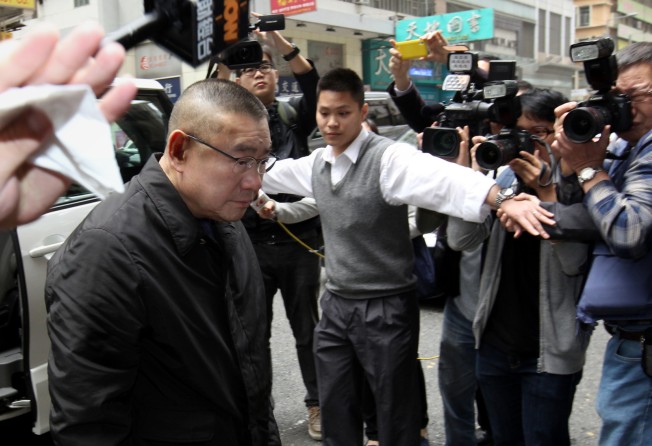Lack of progress on mainland extradition deal impeding justice
Grenville Cross says Macau graft case highlights need for formal extradition deals with rest of China

Obviously crime pays," said Watergate conspirator Gordon Liddy, "or there'd be no crime."
Having been convicted last month by a Macau court of corruption and money laundering, neither tycoon Joseph Lau Luen-hung nor businessman Steven Lo Kit-sing appeared when Judge Mario Augusto Silvestre sentenced each to five years and three months in prison. Instead, both sat it out in Hong Kong, where, incredibly, they enjoy safe haven, beyond the reach of Macau's judiciary. That Hong Kong has no arrangements for the surrender of fugitives to Macau, its neighbouring special administrative region, is little short of scandalous, although the problem is far wider.
While Hong Kong has signed agreements for the surrender of fugitive offenders with 17 countries, including the United States, Britain and India, it still has no formal rendition agreement with mainland China, let alone Taiwan or Macau, which imperils effective law enforcement throughout China.
The lack of a cross-border agreement was highlighted in 1999, when Cheung Tze-keung, a Hong Kong permanent resident nicknamed the "Big Spender", was alleged, with his gang, to have committed kidnappings and explosives offences in Hong Kong and on the mainland. Although both places had jurisdiction over the case, the mainland tried the gang, given that parts of their crimes had occurred in Guangdong and they were arrested there. While views differed over whether Hong Kong should have done more to bring the gang back here for trial, it was apparent that formalised arrangements for the return of criminal suspects were urgently required; yet, 15 years later, they are still not in place.
In December 1998, then secretary for security Regina Ip Lau Suk-yee announced that negotiations were due to start with Beijing on a rendition arrangement, and there were hopes of an early agreement. These, however, petered out, and in August 2007, Ip's successor, Ambrose Lee Siu-kwong, said that "we all hope negotiations will be resumed as soon as possible". Seven years on, the issue remains unresolved. Since reunification, administrative arrangements have had to be relied on to secure the return of fugitives from the mainland, and these depend on mainland goodwill. The mainland authorities, understandably, expect some reciprocity, and their patience must be wearing very thin.
There are major difficulties in the way of a rendition agreement, centring on the quality of the mainland's justice system and the use of the death penalty, but, 17 years after reunification, the Security Bureau should have made some real progress. Hong Kong, however, must not become a refuge for fugitives, and there is no reason why, as a first step, a rendition agreement should not be hammered out with Macau. After all, Macau has a respectable legal system and, crucially, no death penalty.
The lack of a mainland rendition agreement, moreover, calls into question Hong Kong's determination to combat crime. If its patience finally snaps, the mainland could, conceivably, assert its own jurisdiction over cases involving people of Chinese nationality for offences committed in Hong Kong, which would affect local autonomy. After all, Article 6 of the Chinese Criminal Code provides that the occurrence of either an act or a consequence of a crime within the territory of the People's Republic is deemed to constitute the commission of a crime within the territory of the People's Republic, and, on one view, this could embrace offences arising in Hong Kong.
Although Article 19 of the Basic Law confers jurisdiction on local courts over all cases arising here, it does not confer exclusive jurisdiction, as the "Big Spender" saga demonstrated, and if Hong Kong fails to return its offenders for trial, the mainland could respond in kind.
It has often been said, correctly, that adequate safeguards must exist to protect the rights of suspects returned to the mainland, but the mantra that no agreement is better than a bad one is no longer convincing. After all, Macau has a rendition arrangement with the mainland, and China itself has negotiated extradition agreements with other countries, including France, Portugal and Spain, by agreeing not to impose the death penalty on returning fugitives. However convenient the lack of progress may be for the Security Bureau, there appears to have been a huge failure of will.
The Department of Justice may, therefore, have to step in, as is apparently happening over Macau. If Secretary for Justice Rimsky Yuen Kwok-keung can now put Hong Kong's case forcefully to mainland authorities - and persuade them that if they can give some ground in key areas such as the death penalty, this will enhance law enforcement throughout China without undermining the "one country, two systems" principle - a breakthrough may finally be achievable.
Grenville Cross SC, an honorary professor of law at the University of Hong Kong, is vice-chairman of the senate of the International Association of Prosecutors. The views are those of the author